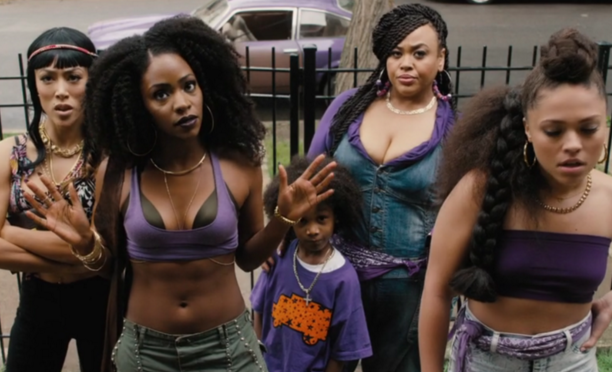When it comes to Spike Lee, the message has always been the same: black lives matter. Long before it became “trendworthy” in the wake of the deaths of Michael Brown, Eric Garner and Freddie Gray–black males who were killed by police officers for no reason beyond the suspicion of a stereotype–Lee was at the front lines of condemning violence brought upon by racial tension (Do The Right Thing being the most overt example of his lifelong filmic thesis).
But what makes Lee’s most recent opus different is its highlighting of black on black crime, the way in which so-called thugs pit themselves against one another for the sake of devoting their life to something–a cause of some kind–simply because there’s little else to choose from (e.g. a conventional job). Opening with an extremely lengthy title sequence in which “Pray 4 My City” by Nick Cannon in the lead role of Demetrius “Chi-Raq”/”Long-D” Dupree plays with the lyrics set against a black screen, we’re given a snapshot of just how preachy Lee is about to get. It is, in fact, this song that is the first indication of triteness. And while, yes, it may be deemed unjust to call a film about the casualties of gun violence bathetic, the stylized way in which Lee portrays his plotline and the characters within it doesn’t always quite come off as anything other than corny.
Let’s take, for example, the lone chorus a.k.a. narrator, Dolmedes (Samuel L. Jackson), who turns such phrases as “In the year 411 BC–that’s before baby Jesus, y’all–the Greek Aristophanes penned a play satirizing his day. And in the style of his time, ‘Stophanes made that shit rhyme. Transplanted today we retain his verse, to show our love of the universe.” With this Baz Luhrmann’s Romeo + Juliet-esque preface established, Chi-Raq–who apparently gets to be called Chi-Raq as a representation of the entire neighborhood, which takes its name after surpassing the death toll number in the Iraq war–comes onto the stage. Before he can finish his performance, one that gets the twenty-first century movie treatment by having text messages pop up on the screen iterating certain lyrics, one of the members of his “organization,” the Spartans, is shot–though not killed.
Later, as his girlfriend, Lysistrata (Teyonah Parris)–called such after the Aristophanes play–prepares herself for giving some late night booty to Chi-Raq, one of the members of the Spartans’ rival gang, the Trojans, comes by to set Chi-Raq’s house on fire. A next door neighbor, Miss Helen (Angela Bassett), comes out to see what’s happened. Upon realizing it’s Chi-Raq, she glares absently at Lysistrata’s frantic urging to call the police. When Miss Helen remains unmoved by Lysistrata’s screams, she counters, “What are you looking at?” Miss Helen balks, “Nothin’,” in that way that’s supposed to indicate that Lysistrata is nothing, mainly because she’s tied herself to the leader of a gang. The next day, Lysistrata goes to Miss Helen to ask her for a place to stay. It is there that the two devise a plan based on Leymah Gbowee’s sex strike that helped bring a halt to the Second Liberian Civil War. Inspired Gbowee, Lysistrata decides to rally women from both the Spartans and the Trojans to bring her own plan into action: No Peace, No Pussy. Her fellow sisters are skeptical at first, they themselves not wanting to give up the “keys to enter.” But as Lysistrata emphasizes the heinous amount of child’s blood recently spilt (a seven-year-old girl named Patti was just killed by a stray bullet), the others instantly see that she’s right to take such an extreme and unlikely measure. And that brings us to the reaction front–everyone in the narrative is quick to react, so easy to be swayed, that it almost makes one wonder how the film could even top out at a full two hours with everything resolved so easily.
And yet, for all of Chi-Raq‘s flaws, there is something so endearing about it–something so quintessentially Spike Lee–that you can’t help but want to bow down the way Nick Cannon does at the end. It may not amount to much as far as influencing change (Lee isn’t as palatable to white people as, say, Beyoncé), but it is proof that Lee remains a consummate auteur. And he’s really good at letting white savior Father Mike (John Cusack) deliver a message that a black person should–though this may very well be yet another case of irony at play in the complex, beautiful mess that is Chi-Raq.





















